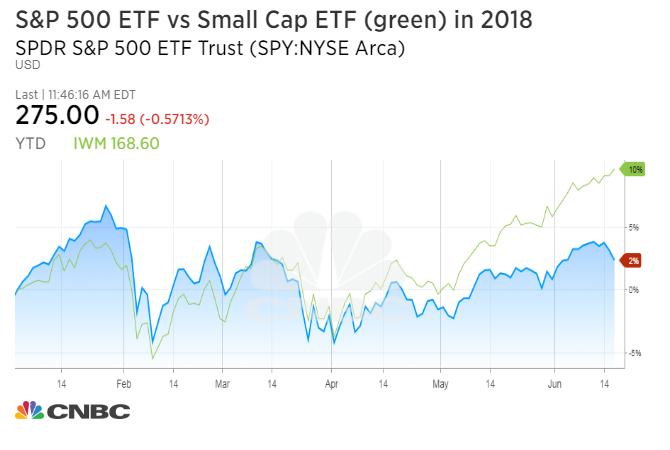Despite the dominance of large technology companies in the stock market’s gains over the last year, small company stocks are forecast to do better if trade war fears come to pass.
Small company stocks have already been outperforming the broad market because of tax cuts and regulatory reform. The iShares ETF tracking the Russell 2000 small-cap index is up 9.3 percent this year compared to the 2.8 percent gain for the S&P 500 and the 0.3 percent drop in the large-cap Dow Jones industrial average.
In a note on Tuesday, J. P. Morgan analysts recommended investors continue to overweight small-cap stocks, seeing them as shielded from the escalating risk of a trade war and U.S. dollar volatility, both of which affect revenue and profit at larger companies with multinational operations.
“We continue to recommend Small-caps as a ‘catch-all trade’ for its high cyclical, reflation and tax policy exposures, as well as lower sensitivity to ongoing trade risk,” Dubravko Lakos-Bujas, J. P. Morgan’s equity strategist, wrote in the note.
Among the iShares small-cap IWM ETF top holdings are GrubHub, an internet food ordering service, which is up 59 percent this year, Exact Sciences Corp., a cancer diagnostics company, up 31 percent, and Aspen Technology, a software maker, up 44.7 percent. These stocks were not mentioned in the J. P. Morgan note.
Small cap stocks benefit because they are more exposed exclusively to the still-growing U.S. economy, show stronger growth trends and have the potential for M&A activity. Large global companies have exposure to Europe and emerging markets, where economic forecasts are being revised lower and financial conditions are tightening.
Small companies are also seen benefiting from tax reform and deregulation, the effects of which haven’t been completely reflected in their stocks. They got almost twice the benefit as large companies from the tax cut in the first quarter, the analysts noted. And domestic companies could get a bigger share of the windfall from individual tax cuts, averaging around $1,500 a household.
But merger activity could also boost small-cap stocks. Large companies brought a lot of cash back to the U.S. after the tax cuts, and that cash is expected to be used in part for deals. Small and mid-sized companies are the potential targets, given new growth opportunities and reduced concern about regulatory issues preventing deals from going through.
Small-caps stocks would be risky if interest rates spiked sharply higher or if there was significantly higher wage growth, because they are more sensitive to labor costs, J. P. Morgan said. A weaker U.S. dollar could also hit small caps, as could declining support for a pro-growth agenda in Washington.
Link to the source of information: www.cnbc.com


 Signal2forex.com - Best Forex robots and signals
Signal2forex.com - Best Forex robots and signals




